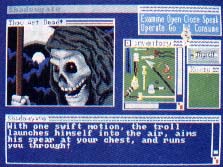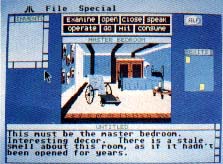For The Fun Of It
Three from Mindscape, Mouse Master and Quest For Clues
by David Plotkin
Computer role-playing games have been around for years. In these you assume the identity of one of the characters in the game, and unlike a book, what you do actually influences the outcome of the story. It's your intelligence and problem-solving ability that decides how--and if you'll achieve the goal of the story.
This issue we'll look at three role-playing games from Mindscape and a piece of hardware to solve your mouse-and-joystick blues. We'll also look at a book to help you in your adventuring.
A Trio Of Role-Playing Games
Mindscape's three role-playing games are Shadowgate, The Uninvited and Deja Vu. Although their scenarios are completely different, their game mechanics are identical. All three games are heavily graphically oriented with no keyboard text entry. Your main screen consists of four resizable graphics and text windows. The center screen window shows what your character sees; double-clicking on most items visible in this window will give you a text description. Often what you see in this window is very important since not all visible objects are described in the text window. In Deja Vu, for example, the silhouette of a mysterious visitor can be seen in your office, but is not mentioned in the text.
The main graphics window also contains command buttons--you give commands by clicking on one of these buttons and then on the object you want to affect in the main graphics window or in your inventory. An unusual feature of these games is that visible items are "live"--you can click on them, drag them to a new location (sometimes) or get a description by double-clicking.
Room and item text descriptions appear in the second window. The inventory window shows you whatever items you're carrying. Clicking on anything in this window will give you a description of the item. If an item can be opened--such as a wallet--you can click on it and then on the OPEN button. Another window will open to show the item's contents and you may transfer them to another item or location.
The last window is the Exits window, which shows all room exits as small colored squares. You can leave a room by double-clicking on an exit square to open a door and then click again to exit. This is very helpful, especially in making use of exits that are not visible in the main window.
Additionally, there are standard GEM drop-down menus so that you can save any number of games, open a new game, begin a new game at any time or quit.
All three games are characterized by humorous responses in some situations. For example, in Shadowgate, looking at yourself in the mirror draws a comment that maybe all that easy living is beginning to tell on your frame! Brush a broom across the mirror and it will tell you that you can see yourself better.
The graphics of all three games are good, with animated sequences on many screens. Where they really excel, though, is their digitized sound. At one point in Shadowgate I opened a coffin and out leaped a bright red banshee, screaming with a blood-curdling yell. For the first time in my gaming career, I jumped clean out of my seat. Of course, the fact that my ST is hooked up to a stereo amplifier and external speakers might have something to do with it, but the sound is really good.
 |
Shadowgate. For the first time in my gaming career, I jumped clean out of my seat--and this game was responsible. |
SHADOWGATE
Of the three, Shadowgate is the toughest to solve and play. In it, you must enter a dungeon and defeat an evil wizard. Besides dealing with fantasy hazards and some very nasty traps, you must constantly replenish your supply of torches, making sure to light a new torch before your old one goes out. (Stumbling around in the dark is instantly fatal.) In fact, Shadowgate is full of deathtraps and it's wise to keep lots of saved games, since you can get into situations where you are trapped because of a slip-up several moves back.
THE UNINVITED
The Uninvited, although menacing, isn't quite as tough to solve as Shadowgate. In this game, you and your brother are involved in a car crash and you lose consciousness. When you awake, your brother is missing and you find yourself outside a haunted mansion. (The car explodes into flame shortly after you crawl out of it--the program comments that this saves you the trouble of calling a tow truck!) Since you don't have anything better to do, you enter the mansion in search of your brother, who has been captured by evil spirits. Magic plays a fairly large part in this adventure, with talking busts, malevolent ghosts (be prepared to die. . .) and some offbeat humor (don't forget to pick up the can of "Ghost-be-gone").
DEJA VU
Deja Vu is the easiest of the three adventures and the one I recommend for beginners. In it, you wake up with amnesia, but all your possessions seem to indicate that you are a private eye and that you are being framed for murder. The object is to stay out of the hands of the police long enough to destroy false evidence and collect the real evidence you need to nail the real culprits. Aiding you in your quest is your revolver, although you can't use it indiscriminately. (Keep it handy though.)
As with the other games, humor abounds. There is a particularly funny (though grisly) sequence where I kept slugging a mugger and every time he made a later appearance he had more damage to his face. Deja Vu's graphics are particularly, well, graphic--you seem to end up belting a lot of adversaries, which seems like a crude way to get things done. Unfortunately, I couldn't seem to get out of some situations any other way.
 |
The Uninvited. In this game you enter a haunted mansion in search of your brother, who has been captured by evil spirits. |
All three of these games are fun and challenging to play and they avoid the frustration of trying to figure out the right words to tell the computer to do what you want. The only complaint I have is that it's sometimes very difficult to use the mouse to click on items you want to use.
MOUSE MASTER
It's not a game, but if you're an inveterate gamer, you'll find Mouse Master invaluable. Mouse Master lets you to plug two joysticks and a mouse into your ST and switch between them. It's the perfect solution to games such as Robotron that require two joysticks and to others such as Major Motion that insist the joystick be plugged into port 0. Some ST games even require that you start them with the mouse plugged in, then unplug the mouse and plug the joystick in. It's a pain to do this repeatedly, especially on the 1040 ST.
Mouse Master is a small box (2 inches by 4 inches by 13/ inches) with a switch on top, three joystick ports and a cable terminating in two plugs. Installing it couldn't be simpler: just plug the two plugs into your ST, then plug your mouse and two joysticks into the Mouse Master. The rocker switch on top of the unit switches port 0 between mouse and joystick.
The only complaint I have about the Mouse Master is that the ports are up-side down, requiring you to twist the joystick and mouse cables to plug them in. Also, the twin cables don't fit well into the groove on the underside of the 1040 keyboard designed to route the mouse/joystick cables out to its edge. But aside from these small complaints, the Mouse Master performs its task well and makes gaming with two joysticks much easier. Its long cable considerably extends the reach of your joysticks and mouse.
QUEST FOR CLUES
Starting with the original "Colossal Cave" adventure, players of computer adventure games have desperately sought help, hints and information to handle particularly difficult aspects. If you play these games, then you have undoubtedly enountered situations where a monster keeps killing off your carefully nurtured character, a door won't open, or a riddle totally stumps you. As Karl Malden says, "What will you do?"
Help is available from various sources. If you own a modem, you could call up a local bulletin board and leave a request for aid in the message area. Or you might refer to the columns which have run in various periodicals and user group newsletters. (Current Notes, published in Sterling, Virginia, has an excellent hints column.) One problem is that sometimes the hints are cryptic and give too little information or give too much information and destroy the challenge of solving the puzzle. Some software companies also publish hint books for their own adventures.
"Quest for Clues" is another way to obtain help. This book, compiled through the not-inconsiderable efforts of a group of adventurers known as "The Questbusters Guild," offers help, hints and even complete maps for 50 games, including such classics as Bard's Tale, Borrowed Time, King's Quest III, Lurking Horror, Moonmist, The Pawn, Spell Breaker and Ultima IV.
The book starts out with a chapter on how the adventure game developed, starting with Crowther and Woods, proceeding through Scott Adams (Adventures), Richard Garriot (Lord British of Ultima fame), Infocom and Sir Tech (Wizardry). (This part alone is fascinating reading.) Then you'll find the meat of the book--the section on helping the stuck adventurer.
 |
In Deja Vu you are a private eye (with amnesia) and dis- cover that you are being framed for murder. |
Several different types of help are available for the games covered. If the adventure has a complex world or maze, the book gives you a map with room names and a special notation that indicates when you must obtain special objects before you can access a room. Not everything is shown on this map--only those locations necessary for solving the adventure. The map is necessarily cursory for huge worlds, such as Ultima IV. There are also general hints for character development and using special skills such as magic.
The next level of help is the "Walkthrough." This section details what locations you need to visit in what order and what to do in each location. Some of the hints are coded (there's a decoding table in the back of the book) to keep you from inadvertently discovering clues you don't want. Depending on the complexity of the game, the walk-through may include tables of information pertaining to a certain phase of the adventure.
Overall, "Quest for Clues" is quite helpful. The coding of the clues is annoying but is a necessary evil to avoid giving away too many clues at once. Often all you need is a slight push in the right direction. If you're stuck on any of the adventures this book covers, then this book is for you.
Dave Plotkin is a data analyst for Chevron US.A. and a frequent contributor to START and Antic.
Products Mentioned
Shadowgate, The Uninvited, Deja Vu, $49.95 each. Mindscape, Inc., 3444 Dundee Road, Northbrook, IL 60062, (312) 480-7667.
Mouse Master, $39.95. Practical Solutions, Inc., 1930 E. Grant Rd., Tucson, AZ 85716, (602) 884-9612.
Quest for Clues, $24.99; $4 shipping and handling. Edited by Shay Adams. Origin Systems Inc., 136 Harvey Road, Building B, Manchester, NH 03053, (603) 644-3360.